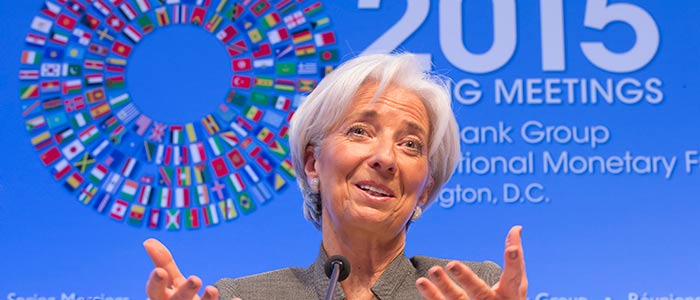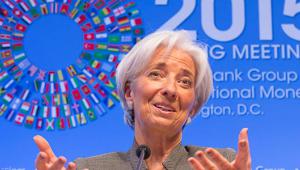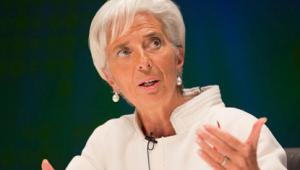WEb_IMF_ChristineLagarde_17169021875_5ac675797e_o.jpg

Christine Lagarde. Credit: IMF Staff Photo/Stephen Jaffe
Speaking in Frankfurt in Germany today, Lagarde stressed that while the economy is not in crisis yet, the recovery remains “too slow, too fragile” and at risk.
She called for world leaders to be “on alert” but “not alarmed” over the loss of momentum in growth.
“The risk of becoming trapped in what I have called a ‘new mediocre’ has increased,” she warned. “We can do better, we must do better – but, to do so, policies must go further. And the policy mix must be more potent.”
She warned that the weak recovery is threatened by long-standing crisis legacies – high debt, low inflation and low productivity – in advanced economies as well as by vulnerable emerging and developing markets, tumbling commodity prices and shocks from terrorism, disease, conflict and mounting inequality.
“These frustrations are leading people to question established institutions and international norms,” she said, in what could be a nod to the UK’s referendum on EU membership, against which she has already spoken out, or the refugee crisis.
“To some, the answer is to look inward, to somehow unwind these linkages, to close borders and retreat in protectionism,” she continued. “As history has told us – time and again – this would be a tragic course. The answer to the reality of our interconnected world is not fragmentation.”
As well as greater global cooperation, she outlined recommendations for individual nations. Echoing the IMF’s calls in February for a broad-based and balanced policy response, Lagarde said a decisive, “three-pronged” approach was needed now.
This will span structural, fiscal and monetary measures. The structural element encompasses supply-side changes, and Lagarde gave some country-specific advice.
She suggested the US boost its labour supply by expanding income tax credit, increasing the minimum wage and strengthening family-friendly benefits.
Euro area countries should implement better training and employment matching policies to help people find jobs, and commodity exporters and many low-income developing countries should diversify their economies, she continued.
Regarding fiscal policy, she called for more growth-friendly measures such as shifting spending to growth-enhancing investments like infrastructure and research and development. Low-income and developing countries could create room for this by reducing costly subsidies, she noted.
“Countries should also prepare fiscally smart contingency measures that can be implemented properly should downside risks materialise.”
She continued to say that, while monetary policy should continue to be accommodative, it is clear that it can “no longer be the alpha and omega to recovery” and needs to be combined with the fiscal and structural measures.
“Implementing this ‘three-pronged approach’ will involve going beyond the status quo – and possibly crossing political red lines,” she stated.
“There is always a good reason not to act. But that would be precisely the wrong move. The growth momentum is weak, risks are probably on the rise and confidence is sorely lacking. Now is the time for leadership. And now is the time for cooperation.
“In sum, if each country plays its part, the global economy will be better for all.”












